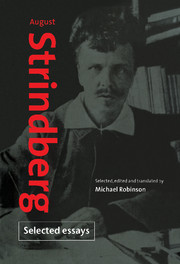Book contents
- Frontmatter
- Contents
- Notes on the text
- Introduction
- from Vivisections (1887)
- ‘On Modern Drama and Modern Theatre’ (1889)
- from Vivisections II (1894)
- ‘Césarine’ (1894)
- ‘Deranged Sensations’ (1894)
- ‘In the Cemetery’ (1896)
- from Jardin des Plantes (1896)
- ‘Introduction’
- ‘The Death's Head Moth’
- ‘Indigo and the Line of Copper’
- ‘To the Heckler’
- ‘On the Action of Light in Photography’ (1896)
- ‘A Glance into Space’ (1896)
- ‘Edvard Munch's Exhibition’ (1896)
- ‘The Synthesis of Gold’ (1896)
- ‘Contemporary Gold-Making’ (1896)
- ‘The Sunflower’ (1896)
- ‘The Mysticism of World History’ (1903)
- ‘August Strindberg on Himself’ (1909)
- Notes and commentary
- Index
‘Introduction’
Published online by Cambridge University Press: 18 December 2009
- Frontmatter
- Contents
- Notes on the text
- Introduction
- from Vivisections (1887)
- ‘On Modern Drama and Modern Theatre’ (1889)
- from Vivisections II (1894)
- ‘Césarine’ (1894)
- ‘Deranged Sensations’ (1894)
- ‘In the Cemetery’ (1896)
- from Jardin des Plantes (1896)
- ‘Introduction’
- ‘The Death's Head Moth’
- ‘Indigo and the Line of Copper’
- ‘To the Heckler’
- ‘On the Action of Light in Photography’ (1896)
- ‘A Glance into Space’ (1896)
- ‘Edvard Munch's Exhibition’ (1896)
- ‘The Synthesis of Gold’ (1896)
- ‘Contemporary Gold-Making’ (1896)
- ‘The Sunflower’ (1896)
- ‘The Mysticism of World History’ (1903)
- ‘August Strindberg on Himself’ (1909)
- Notes and commentary
- Index
Summary
Having reached the middle of my life's journey, I sat down to rest and consider. Everything I had hitherto boldly dreamt and desired, I had attained. Sated with shame and honour, pleasure and suffering, I asked myself, ‘What is going to happen now?’
Everything was repeated with deadly monotony, everything was the same as it always was, everything happened all over again. The older generation had said, ‘The universe has no secrets; we have explained all the riddles, we have solved all the problems. By means of the spectroscope we have found that the sun lacks oxygen, which does not prevent it from burning just as well as antimony in chlorine or copper in sulphur.
‘We have traced the canals on Mars, which bear a disturbing resemblance to the Widmannstätten figures on meteorites, and yet we have only just recently gained a clear idea of what the interior of Africa looks like, and we know nothing about either Borneo or the Polar Sea.’
A generation, which has had the courage to abolish God, to destroy both state and church and society and morals, nevertheless bowed down before science. And in science, where freedom ought to reign, the watchword was ‘believe in authority or die!’ No Bastille column had yet been erected where the old Sorbonne stood, and the cross still reigned over the Panthéon and the cupola of the Institute.
There was thus nothing further to do in this world, and, feeling useless, I decided to disappear.
- Type
- Chapter
- Information
- August Strindberg: Selected Essays , pp. 147 - 148Publisher: Cambridge University PressPrint publication year: 1996



